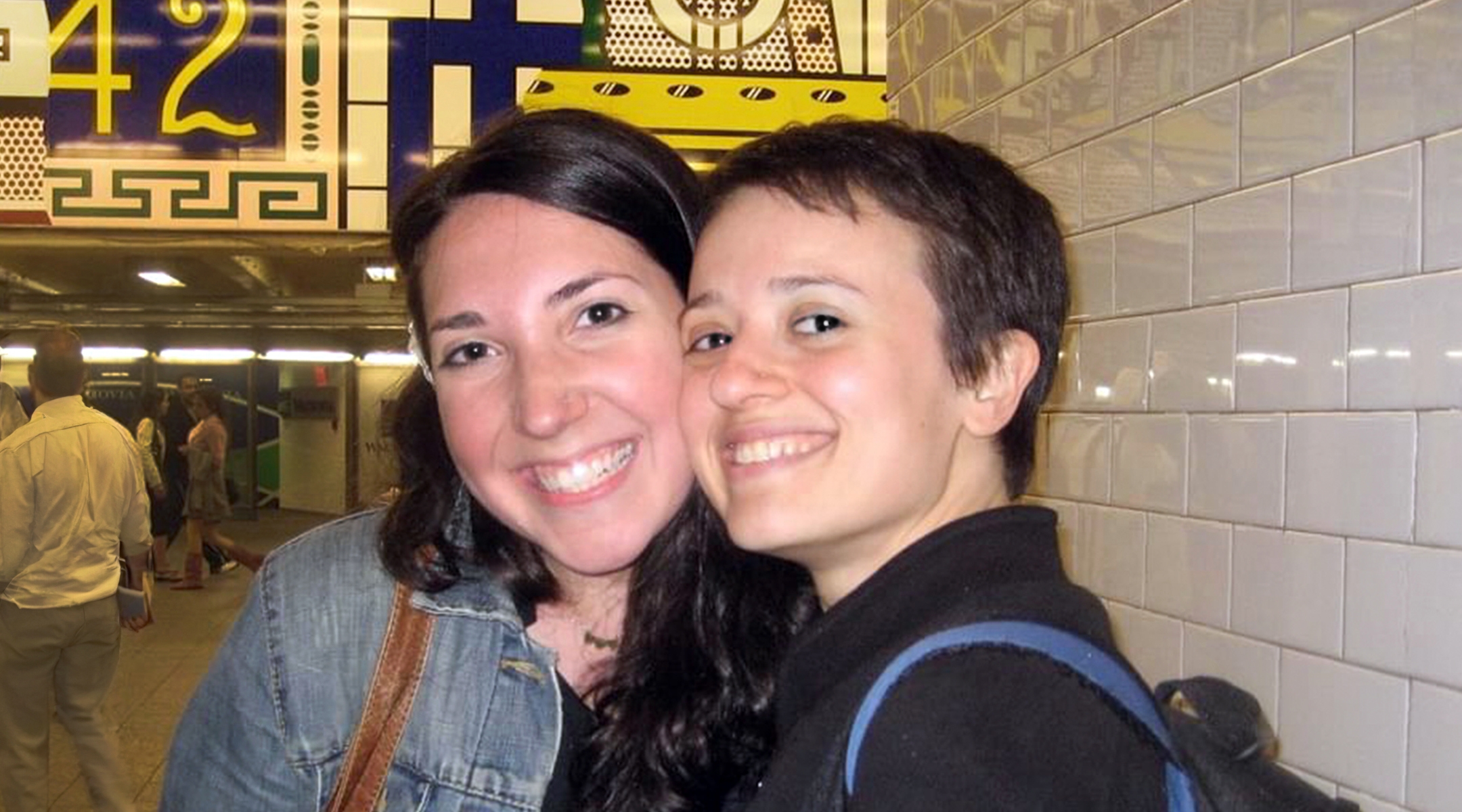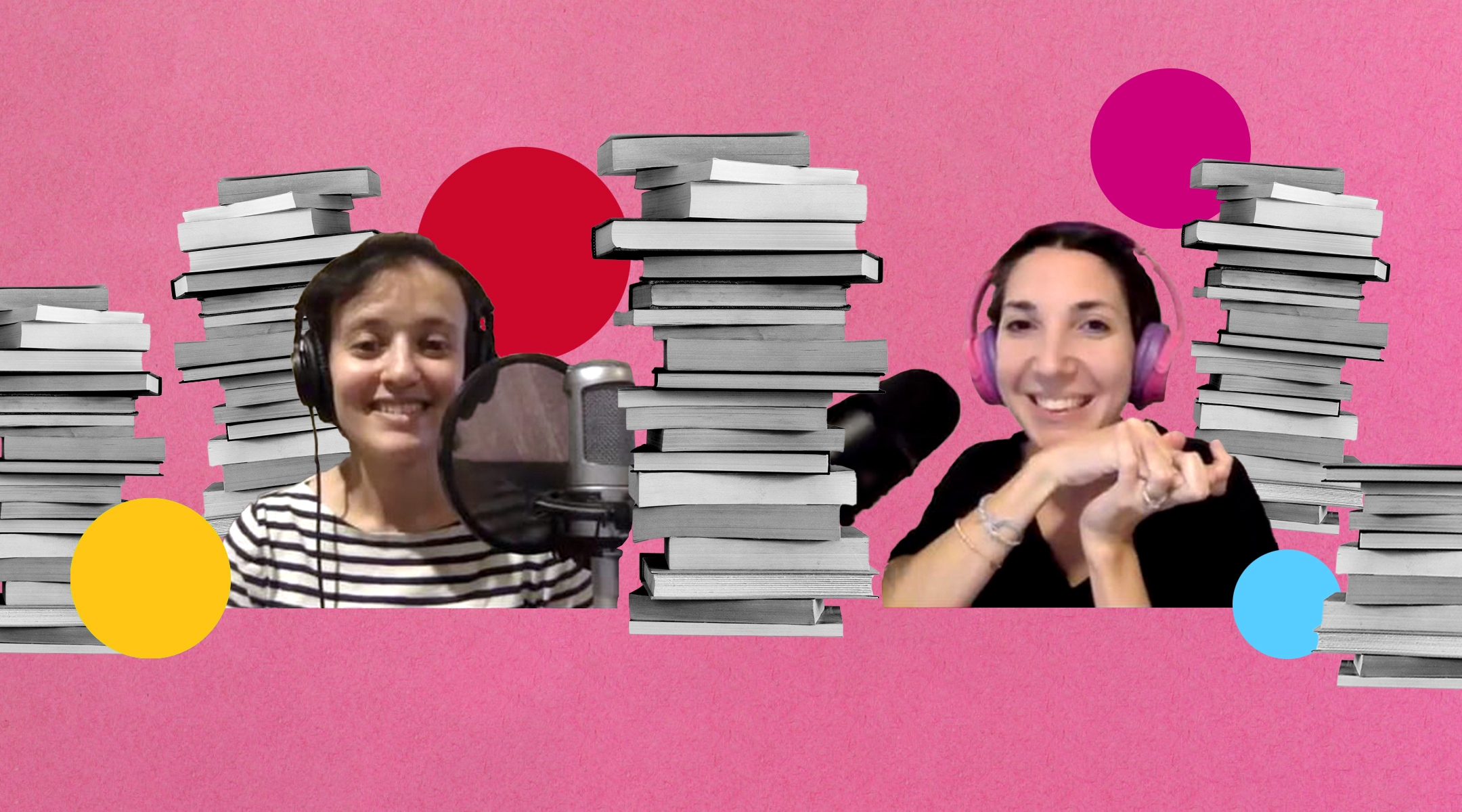(New York Jewish Week) — First things first: Despite its name, there is no erotica and sometimes no Hanukkah in the Hanukkah Erotica Book Club.
Instead, the “book club” is actually a biweekly podcast about Jewish romance novels. Hosted by close friends and stepsisters Malya Levin and Rachel Mintz — who goes by her “Hebrew” name, Raizel, on the show — the duo discuss a different Jewish-themed romance novel each episode while simultaneously unpacking their Jewish identities and their experiences dating in New York City.
The podcast’s name, Hanukkah Erotica, came from a nickname Mintz coined for a genre that she didn’t even know existed until one year ago. That’s when she read her first-ever Jewish romance novel, “I’ll Be Home for Hanukkah” by KK Hedrin, about a big-city Jewish girl named Shayna Adler who finds herself living out a bizarre Hallmark Christmas-movie fantasy with a Jewish colleague when they get stuck in North Pole, Alaska over the holiday.
“I was very connected to the material,” Mintz told the New York Jewish Week. “It felt very nostalgic to the early 20s Malya and I experienced.”
Levin concurs. “Our relationship really formed during our early 20s on the Upper West Side, when we were coming into our own Jewish identities and having a lot of funny, stereotypical young single Jewish woman experiences,” she said.
Mintz and Levin, both 39, met shortly after they graduated college, when their parents started dating. They quickly became close as Mintz was looking to move to the Upper West Side. Levin was already living there, and as they became involved in the Jewish communities in the neighborhood, their social circles began to intertwine.
Now married with children — Brooklynite and elder abuse lawyer Levin has four and New Jersey-based Mintz has two — the podcast gives them an opportunity to spend time with each other, bonding over their mutually beloved book genre.
Jewish romance novels are a burgeoning genre that are written about Jewish protagonists, usually by Jewish authors. Like other publishing categories, romance has become more diverse in recent years, with novels centering on people of color, gay and lesbian characters and the neurodivergent. Authors like Elissa Sussman — author of “Funny You Should Ask” — and Jean Meltzer — author of “The Matzah Ball” and “Kissing Kosher” — have released best-selling novels in the last few years about Jewish protagonists seeking love. Jewish romance authors have attempted to change the narrative about Jewish stories to include joy and positivity — as the genre rule of romance is that there always has to be a happily ever after.
Then there’s The Ripped Bodice, a romance-only bookstore owned by Jewish sisters Leah and Bea Koch with locations in Brooklyn and Culver City, California. “We’re very passionate about fostering diverse narratives in romance novels,” Leah told the New York Jewish Week. “Highlighting Jewish representation in this genre is so important, especially for a group of people that is almost entirely represented by stories of tragedy. We love to introduce people to Jewish stories of love and joy.”
To that end, the Brooklyn bookstore is hosting Hanukkah Erotica’s first-ever live show on Dec. 13. Leah Koch calls the Hanukkah-themed event “a celebration of Jewish identity and inclusivity.”
“For us, it’s brought about a lot of thinking about our Jewish identity, Jewish practice,” Mintz said of the Hanukkah Erotica Book Club. “It sounds silly, but these books have made us think about a lot of aspects about Jewish identity and Jewish peoplehood.”
Mintz, a preschool director and adjunct professor, told the New York Jewish Week she has read romance novels for as long as she can remember; she treated the genre as “a palate cleanser between ‘great books,’” she said.
Levin, meanwhile, had never read a romance novel when Mintz convinced her to read “I’ll Be Home for Hanukkah.” She admits she had many preconceived notions about the genre and was surprised by how much the novel resonated with her — right down to the protagonist bringing packets of tuna with her on vacation.
“Was this written for anyone except for me?” Levin recalls thinking. “That’s what it felt like.”
Mintz was shocked by the amount of feedback she got from friends after sharing passages and quotes from Jewish romance novels on Instagram — they were fascinated by these novels and wanted to know more about them, she said.
“It seemed like people were coming out of the woodwork and seemed interested in engaging in this conversation about this Jewish romance book,” Mintz said. “And I know Malya and I kind of banter and have this rapport. So when she said ‘this book is speaking to me,’ I knew we needed to book club this together and do it on a podcast.”

Now 38, the stepsisters and close friends, shown here in 2010, met as young women in the Upper West Side. (Courtesy)
Levin and Mintz give the impression of being in conversation with their audience, almost as if one is not listening to a podcast, but rather chatting with old friends.
That’s by design: The duo wanted “Hanukkah Erotica” to resemble a book club that discusses the books in the context of their lives. Both Mintz and Levin go into rambles about previous jobs, dating experiences and different segments of the romance community, giving listeners an insight into their lives. Their dynamic is casual and funny without trying to be.
“I don’t know that we could talk about these books without weaving our own personal experiences in, because that’s part of why we like these books,” Mintz said. “If they’re speaking to us, they’re probably speaking to other people.”
The stepsisters, while sharing a similar sense of humor and interests, grew up in very different Jewish communities: Levin grew up Orthodox in Brooklyn and Passaic, New Jersey, while Mintz was a member of a Conservative synagogue in Great Neck, New York. As Mintz and Levin draw upon their Jewish backgrounds, each host has moments when she can connect to aspects of a book that the other cannot.
On the podcast, which is produced by Levin’s husband, William, the pair often debate the novels’ depictions of Judaism and whether they find them to be accurate. They’ve taken on topics like whether an author took creative license when describing a Jewish deli that serves brisket and latkes with sour cream, or whether or not anyone goes to a Wednesday night Torah reading as a social event. (Turns out, said Levin, that some of their listeners do.)
One year and 25 episodes after starting “Hanukkah Erotica,” many aspects of the podcast have changed. What was initially conceived as a short-term podcast only focusing on Hanukkah romance evolved into a broader discussion about the Jewish romance genre.
“Once we finished Hanukkah, we didn’t feel done,” Mintz added. “Once we realized there was more out there in Jewish romance, we still wanted to have this conversation.”
They’ve since delved into High Holiday romances, Purim romances and Jewish summer camp romances. In the process, Mintz and Levin have realized that the world of Jewish romance extends into all the subgenres and tropes that non-religious romance does.
The podcast has also devoted episodes to Jewish romantic movies and television, featuring guest stars like Aleeza Ben Shalom from the Netflix reality show “Jewish Matchmaking” and Jonah Platt, star of Hulu’s 2022 holiday film, “Menorah in the Middle.”
With Hanukkah beginning on Thursday evening, Dec. 7, the pair are planning for their live Hanukkah episode to be about “Eight Kinky Nights” by Xan West, a novel described as “kinky polyamorous Chanukah f/f romance.” (F/f stands for “female/female.”) They also plan to cover “Round and Round,” the new Hallmark Hanukkah movie starring Bryan Greenberg — who they hope to get on the podcast — as well as “Eight Dates and Nights,” a new teen romance by Betsey Alderedge.
“For us, it’s brought about a lot of thinking about our Jewish identity, Jewish practice,” Mintz said of the Hanukkah Erotica Book Club. “It sounds silly, but these books have made us think about a lot of aspects about Jewish identity and Jewish peoplehood.”
“The idea that Jewish Jewish readers like us can find themselves in any of these books, I think, is exciting. And we want to kind of broadcast that and highlight it,” Mintz said.
The New York Jewish Week brings you the stories behind the headlines, keeping you connected to Jewish life in New York. Help sustain the reporting you trust by donating today.





